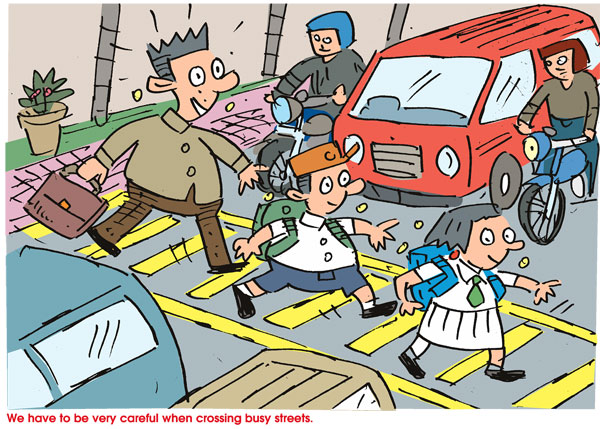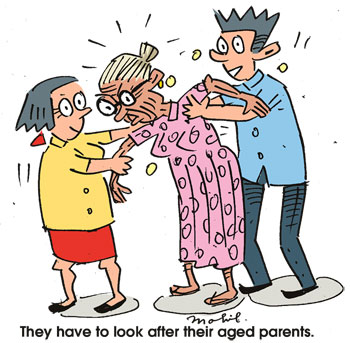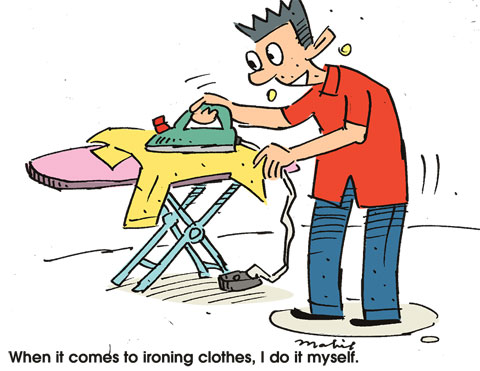|

by R. S. Karunaratne
Know your modal verbs
[Part 2]
'Must' and 'need' are modal verbs.To make them negative, we add
'not.'
I must not go there hereafter.
We must not wait here till midnight.

You must not kill innocent animals.
He must not waste time watching teledramas.
She must not neglect her studies.
They must not contest the elections.
Note: 'Must' can be contracted as 'mustn't'. When we say 'must not',
we mean 'don't do it.' However,
'need not' means 'this is not necessary.'
I need not attend all the committee meetings.
We need not service our vehicles every day.
You need not pay now.
He need not sign all the papers.
She need not go abroad to study law.
They need not do politics to get a job.
[Activity 1]
Fill in the blanks with 'mustn't' or 'needn't'. Check your answers
with the key.
1. We ............ be in a hurry; there's time for the show.
2. We ............ hurry because we have started very early.
3. You ............ stay up late because you have an examination
tomorrow.
4. You ........... wash my clothes; I can do it myself.
5. You ........... leave the main door open; there's a thief prowling
around.
6. You ........... leave the door open; Sam has a duplicate key.
7. You .......... speak to strangers when you travel.
8. You .......... write to me; I'll be in touch with you.
9. You ........... drive so fast; the Traffic Police will stop you.
10. You .......... collect money for his father's funeral; they're rich
people.
'Have' is not a modal verb. However, we use 'have to' like 'must.' We
also use 'don't have to' like
'needn't.'
I have to attend his funeral this evening.
We have to be very careful when crossing busy streets.
You have to pass the G.C.E. A/L examination to enter university.
He has to save a lot of money to buy a car.
She has to work on Saturday from next month.
They have to look after their aged parents.
[Negatives]

I don't have to go to office on public holidays.
We don't have to wait till he comes.
You don't have to agree with me all the time.
He does not have to sit the examination again.
She doesn't have to attend classes now.
They don't have to go abroad for higher studies.
[Activity 2]
Fill in the blanks with 'don't have to' or 'doesn't have to.' Check
your answers with the key.
1. You ................ drive so fast.
2. I .................. meet the principal today.
3. Eva ............. water the plants as it is raining.
4. He ................. write letters now. He can email them.
5. You .............. phone your sister; she already knows what
happened.
6. I .................. go to school today; it's a public holiday.
7. You ............... go by train; father will give you a lift.
8. Nayana ............... post those letters; mother is going to the
post office.
9. You ............. lock the doors; I'll do it for you.
10. You ................ speak English here; nobody understands it!
**************
Key:
Activity 1 :
1.mustn't 2. needn't 3. mustn't 4. needn't 5. mustn't 6. needn't 7.
mustn't 8. needn't 9. mustn't 10. needn't
Activity 2:
1.don't have to 2. don't have to 3. doesn't have to 4. doesn't have
to 5. don't have to 6. don't have to 7. don't have to 8. doesn't have to
9. don't have to 10. don't have to
**************
Starters:
How to use reflexive pronouns
Reflexive pronouns are "myself, yourself, himself, herself, itself,
oneself, ourselves, yourselves" and
"themselves." A common use of reflexive pronouns is to talk about
actions where the subject and
object are the same person.
I cut myself while shaving.
I looked at myself in the mirror.
Did you hurt yourself while running?

He dried himself after coming out of the swimming pool.
She wiped herself after a bath.
The dog scratched itself with its paw.
Talking to oneself is an early sign of madness.
We helped ourselves at the party.
You can dry yourself on this towel.
You can watch yourselves on video.
We use reflexive pronouns for emphasis.
When it comes to ironing clothes, I do it myself.
The inspector spoke to me himself.
Your house itself is nice, but it has no garden.
The minister himself came for the opening of the library.
She built the house herself while her husband was employed abroad.
Are you doing all the cooking yourself?
The principal himself interviewed me.
Where is Jane? You yourself took her to the park.
We sometimes use reflexive pronouns instead of personal pronouns
after "as, like, but and except."
These briefcases are designed for executives like yourself. (or like
you)
Everybody went on the trip except myself. (except me)
"By myself" or "by yourself" means "alone" or "without anybody else's
help."
A: do you need help?
B: No, Thanks. I can do it by myself.
We do not use reflexive pronouns with the following verbs:
Do you shave everyday?
Suddenly, the door opened.
My books are selling.
Try to concentrate.
I feel sorry for him.
Rani dresses well.
Janaka hurried to catch the last train to Kandy.
The following verbs are often found in reflexive constructions.
The woman burnt herself.
The child cut himself.
The soldiers defended themselves.
The murder suspect killed himself.
The planter shot himself.
We use reflexive pronouns with verbs connected with behaviour or
emotion.
You must behave yourself!
I blamed myself for not answering the last question.
When you are angry, try to control yourself.
Children, enjoy yourselves!
We use reflexive pronouns with verbs which are not normally
reflective.
Having obtained a distinction in English, I congratulated myself!
Martin Wickremasinghe educated himself by reading books.
The speaker introduced himself before delivering the lecture.
I taught myself how to type.
[Activity]
Use reflexive pronouns where necessary and check your answers with
the key.
1. Padma ................. every morning. (weigh)
2. Some people .............. while working. (talk)
3. I .............. at the birthday party. (enjoy)
4. Amanda is good at languages. She is ........... French now. (learn)
5. If you ............... I'll give you an ice-cream. (behave)
6. Stop ................; there are a lot of people who are unhappy.
(feel sorry for)
7. If somebody else is ready to say something about you, you have to
.............. . (introduce)
8. You ought to .................... . I have never seen such
badly-behaved children. (be ashamed of)
9. When you look in a mirror, you ............. . (see)
10. Sai Baba ............. gave it to me. (he)
**************
Key:
1. weighs herself 2. talk to themselves 3. enjoyed myself 4. learning
5. behave yourself 6. feeling sorry for yourself 7. introduce yourself
8. be ashamed of yourself 9. see yourself 10. himself
**************
Match words and meanings
Here's a novel way to enrich your vocabulary. Match the words in
column 'A' with their meanings in
column 'B.' Check your answers with the key. The first one has been done
for you.
[Column A]
L 1. bankable
.... 2. bankroll
.... 3. banns
.... 4. banquet
.... 5. banter
.... 6. barb
.... 7. barbaric
.... 8. barbecue
.... 9. barber
.... 10. bard
.... 11. bare
.... 12. barefaced
.... 13. barefoot
.... 14. bareheaded
.... 15. bargain
.... 16. barge
.... 17. bark
.... 18. barmaid
.... 19. barman
.... 20. barmy
.... 21. barn
.... 22. barnstorming
.... 23. barometer
.... 24. baronial
.... 25. barracks
[Column B]
A. public announcement, made in a church, that two people are going
to get married
B. the sharp part which points backwards from a fish hook
C. a man whose job is cutting men's hair
D. without any clothes or not covered by anything
E. not wearing any shoes or socks
F. without any covering on your head
G. a large formal meal for many people
H. extremely cruel and unpleasant
I. a poet
J. to hurry somewhere in a rude way
K. the hard outer covering of a tree
L. likely to make money
M. a device that measures air pressure
N. a building where soldiers live
O. very large, grand and impressive
P. exciting and energetic
Q. a large building on a farm in which hay and grain are kept
R. a man who serves drinks in a bar
S. behaving strangely or very silly
T. a woman who serves drinks in a bar
U. something on sale at a lower price than its true value
V. not tying to hide your bad behaviour
W. a metal frame on which meat, fish or vegetables are cooked outside
over a fire
X. conversation which is funny and not serious
Y. to support a person or activity financially
**************
Key:
2. Y 3. A 4. G 5. X 6. B 7. H 8. W 9. C 10. I 11. D 12. V 13. E 14. F
15. U 16. J 17. K 18. T 19. R 20. S 21. Q 22. P 23. M 24. O 25. N
************** |

